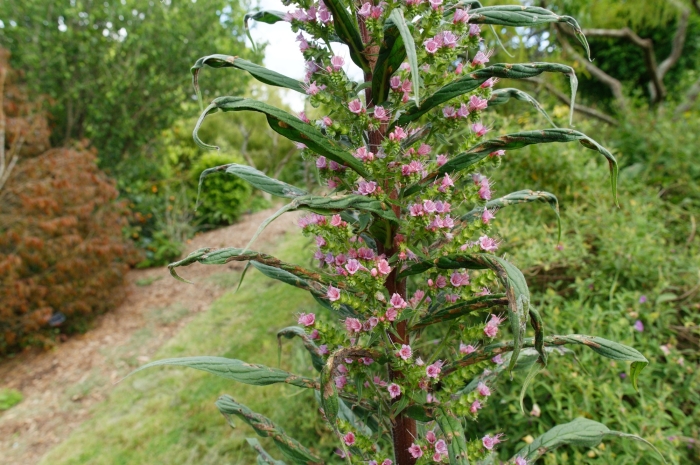Pine Echium
(Echium pininana)
Pine Echium (Echium pininana)
/
/

Lek Khauv
CC BY 4.0
Image By:
Lek Khauv
Recorded By:
Copyright:
CC BY 4.0
Copyright Notice:
Photo by: Lek Khauv | License Type: CC BY 4.0 | License URL: http://creativecommons.org/licenses/by/4.0/ | Rights Holder: Lek Khauv | Publisher: iNaturalist | Date Created: 2016-11-26T16:20:38-08:00 |


















































Estimated Native Range
Summary
Echium pininana, commonly known as Pine Echium, is a semi-deciduous biennial or triennial herb, originally from laurel forests and rocky sites in the Canary Islands. It has a unique life cycle, with each plant living for two to three years. Echium pininana can reach up to 4 meters (13 feet) in height, with a striking flower spike that may grow 5 cm (2 inches) per day between April and June. The flowers are deep blue to violet, funnel-shaped, and densely packed along the spike, creating a dramatic display. They produce a significant amount of nectar with high sugar content, which is highly attractive to pollinators like bees, butterflies, and moths. After pollination, each flower yields four nutlets, and a single plant can produce over 200,000 seeds, dispersed by wind over short distances.
Pine Echium is valued for its spectacular flower spikes and is often used as a focal point in gardens. It has received the Royal Horticultural Society’s Award of Garden Merit, indicating its exceptional qualities as an ornamental plant. In cultivation, it is typically used as a bedding plant or in borders, and it thrives in full sun with well-drained soil. While it is half-hardy in Britain and Ireland, it can self-seed and potentially adapt to become more cold-tolerant. Gardeners should provide a sheltered location to protect the large leaves from wind damage. Care should be taken where this species is grown outside its native range, as it can become invasive. It is most vulnerable to frost in its first year and requires protection during cold spells.CC BY-SA 4.0
Pine Echium is valued for its spectacular flower spikes and is often used as a focal point in gardens. It has received the Royal Horticultural Society’s Award of Garden Merit, indicating its exceptional qualities as an ornamental plant. In cultivation, it is typically used as a bedding plant or in borders, and it thrives in full sun with well-drained soil. While it is half-hardy in Britain and Ireland, it can self-seed and potentially adapt to become more cold-tolerant. Gardeners should provide a sheltered location to protect the large leaves from wind damage. Care should be taken where this species is grown outside its native range, as it can become invasive. It is most vulnerable to frost in its first year and requires protection during cold spells.CC BY-SA 4.0
Plant Description
- Plant Type: Herb
- Height: 15-18 feet
- Width: 2-3 feet
- Growth Rate: Rapid
- Flower Color: Blue, Pink, Purple
- Flowering Season: Spring, Summer
- Leaf Retention: Semi-Deciduous
Growth Requirements
- Sun: Full Sun
- Water: Low
- Drainage: Fast
Common Uses
Bank Stabilization, Bee Garden, Bird Garden, Border Plant, Butterfly Garden, Deer Resistant, Drought Tolerant, Hummingbird Garden, Salt Tolerant, Showy Flowers
Natural Habitat
Laurel forests and rocky sites in the Canary Islands
Other Names
Common Names: Tree Echium, Tower Of Jewels, Giant Viper’s-Bugloss, Pininana, Riesen-Natternkopf
Scientific Names: , Echium pininana,
GBIF Accepted Name: Echium pininana Webb & Berthel.